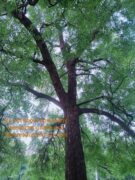There are no waste heaps in jungles, deserts or any other places in nature where humans are not present. Waste management is essentially a human problem-nature has no problem at all in managing all the waste that is produced in nature all the time- animal poop, waste leaves, dead remains of plants and animals and so on. So how is nature able to manage waste while we aren’t? The answer lies in the twin processes of disinfection and decomposition that go on continuously in nature.
The sun is a powerful disinfectant in nature. Whenever the sun rays shines at feces of any animal or at dead bodies, the high heat and UV rays dehydrate and kill the germs. The other step is done by the microorganisms present in the earth which break down the organic matter into humus which becomes part of the soil itself. Elementary process of formation of layers of soil which we have all studied in school. That part of organic waste which can be eaten by any animal is eaten up, and rest of it broken down by micro beings and becomes soil again.
So how can we replicate this process in waste management? To answer this question pertinently, we need to enumerate the components of everyday waste which is forming the waste problem, for segregation lies at the heart of waste management. First component is animal poop. For cattle and goats, i.e the vegetarian animals, the poop can be safely used as manure by allowing it to convert into manure either by vermicomposting or normal heap composting. However the poop of cats and dogs has harmful e coli bacteria in it and the way to compost is to first dehydrate and disinfect it using high temperatures (using solar energy) and then allow the microorganisms in soil to decompose it. These processes would happen simultaneously and naturally in open areas where humans don’t tread on the poop. The invention of solar poop composters may solve the problem in ultra concretized urban areas where dog /cat poop becomes a roadside menace.
The second kind of waste is the kitchen waste, which forms around 60% of the waste that is produced from any household everyday. Animals would love to consume what we consider as food waste- be it left over non veg waste for dogs and vegetable waste for cattle. And what cannot be eaten by either would be broken down by microorganisms. However instead of allowing this to happen by a small intervention of creating food troughs on every street for putting food out for dogs and cattle, we make leftovers into waste that is trapped in polythene bags and left to rot forever, or become a hazard for the cows who consume the polythene also in quest of the food that is inside it. In addition, putting any waste that is organic inside the polythene bag , makes the polythene also ineligible for recycling and it ends up in landfills, a most glaring example of being the wazirpur landfills in delhi. So it is imperative that food leftovers reach animals, and that food that is inedible, is composted. The very vague classification of ‘wet’ and ‘dry’ waste in India , prevents people from understanding that any organic matter must never be put in polythene bags, for then it will definitely create a landfill component.
The third kind of waste is cardboard and packaging stuff. These are entirely recyclable items and must be collected separately to be given to waste collectors for recycling. Putting them in waste bins along with other waste is nothing less than a crime against earth.
Then is the infrequent broken glass waste. Intact glass bottles must always be collected separately as they are prized items for recyclers and rag pickers. However even broken glass is a highly recyclable item and must be neatly collected separately in old lidded paint buckets, so that the bucket once full can be given to the recyclers.
The metal wastes like stapler pins, old nails etc, must be collected in old plastic water bottles and safely given for recycling. Metals, glass and plastic items, if not collected carefully, can form a hazard for anyone coming in contact with them, be it human or animal, and also form a environmental threat.
Finally is human mensural and blood waste and medical waste. Human mensural pads are best replaced by recyclable cloth pads which are amazingly safe and leak proof these days, or by a menstrual cup, as per one’s preference. If at all the use and throw plastic pads are used in dire circumstances, one must be very careful to dispose them most hygienically.
Finally is the despicable practice of dispersing one’s spit and clearing one’s nose and throat of phlegm in roads and public places. This is nothing but a bad habit that is somehow just carrying on and on and lends a very ugly and unhygienic picture to our public places. We urgently need to understand phlegm management, and that if in dire circumstances we do have to emit some excretion , it must be covered with soil and not left exposed to flies and any being contacting
The most crucial aspect of solid waste management is to decentralize composting and have every citizen experience it. It is essential thing to be taught right from schools- how to manage the waste we produce it. The soil of the earth is our biggest ally- if we learn to use it for composting all that comes from it and segregating and recycling the rest. If we are not able to pay attention to and learn to manage solid waste now, it may be too late.

Comments